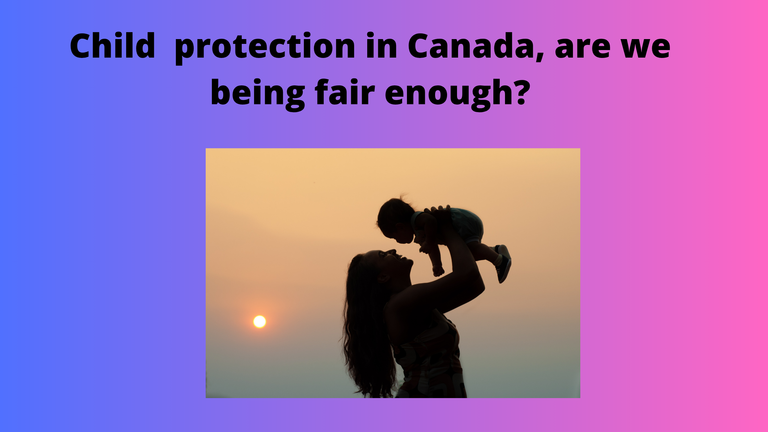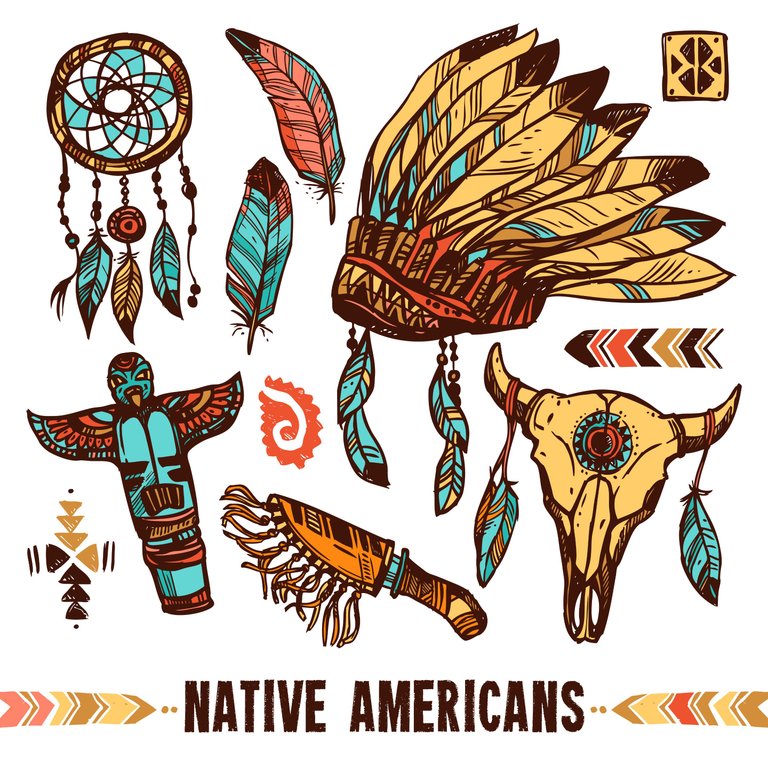Child protection in Canada, are we being fair enough?

It is interesting how social concerns are different in different countries. I left Brazil, a country with high social disparities, and most of the social problems were happening with the poor people that was located in slums. In Canada, I noticed something different: we have less poverty. But we also have social problems and mainly with the indigenous people or First Nations. Canada until now hasn't learn how well to deal with these people that was here before Europeans. One of the consequences is how to protect their children as they have a different culture and traditions?

Every kid deserves protection, which sometimes the parents fail at. People get scared when they see a pets not being treated well, and what about humans? Some parents just don't care about their children and abuse them, or don't give them basic needs for them to grow, such as access to education, nutrition and medical needs. The Child and Family Services should intervene cautiously when there is a report about something happening to a family that fails in protect their kids. However, we have been failing when dealing with the indigenous people.
At first, we had the residential schools that were an attempt to assimilate the indigenous people into the European-Canadian culture. Those were government-funded schools in 1831, where the parents couldn't even see their kids anymore. The last school was closed in 1996, and an estimated 6,000 kids died in these schools. Since then, the country has still made some efforts to mourn this dark history. And now we see that the regular Child and Family services fails also fail with these people.
I read that in 2024, from 18 young children that died in the care of the Child and Family Services in Alberta, 16 were from indigenous people . The causes of death include suicide and accidental, in addition to others still under investigation. In 2020, the federal government released a new bill that provides the responsibility of child welfare in indigenous territory to be organized by the local indigenous community.
Despite this problem, Child and Family Services are still important, and I can't see them as a pure government institution since they need society's help fostering the kids that receive intervention. Here you can register to be a foster family and I heard very beautiful stories of participants who lived with children who were mistreated in their original home. These foster families many times they have an amazing experience and also help these kids to dream with their future.

Child and Family Services are an important service, and despite representing our local government, it is important to intervene when necessary. But it showed that it can't be used when dealing with indigenous people. Indigenous communities couldn't be inserted into our society, and we failed a lot in the past, and still don't know how to deal with them. We are the ones who introduced synthetic drugs to them, the ones who took their children from them and the ones who are forcing them to live our way of life. Maybe one day, they will be happy again, living their own way of life.



É interessante como as preocupações sociais são diferentes em cada país. Saí do Brasil, um país com altas disparidades sociais, e a maioria dos problemas sociais afetava a população pobre que vivia em favelas. No Canadá, notei algo diferente: temos menos pobreza. Mas também temos problemas sociais, principalmente com os povos indígenas ou as Primeiras Nações. O Canadá até agora não aprendeu a lidar bem com essas pessoas que estavam aqui antes dos europeus. Uma das consequências é como proteger seus filhos, já que eles têm uma cultura e tradições diferentes?

Toda criança merece proteção, o que às vezes os pais falham em fazer. As pessoas se assustam quando veem um animal de estimação maltratado, e os humanos? Alguns pais simplesmente não se importam com seus filhos e abusam deles, ou não lhes dão as necessidades básicas para que cresçam, como acesso à educação, nutrição e cuidados médicos. Os Serviços para a Infância e a Família devem intervir com cautela quando há relatos de algo acontecendo com uma família que não protege seus filhos. No entanto, temos falhado em lidar com os povos indígenas.
No início, tínhamos as escolas residenciais, uma tentativa de assimilar os povos indígenas à cultura europeu-canadense. Essas eram escolas financiadas pelo governo em 1831, onde os pais não podiam mais ver seus filhos. A última escola foi fechada em 1996, e estima-se que 6.000 crianças morreram nessas escolas. Desde então, o país ainda tem feito alguns esforços para lamentar essa história sombria. E agora vemos que os serviços regulares para a Infância e a Família também falham com essas pessoas.
Li que, em 2024, das 18 crianças que morreram sob os cuidados dos Serviços para a Criança e a Família em Alberta, 16 eram de povos indígenas . As causas de morte incluem suicídio e morte acidental, além de outras ainda sob investigação. Em 2020, o governo federal publicou um novo projeto de lei que prevê a responsabilidade do bem-estar infantil em territórios indígenas, a ser organizado pela comunidade indígena local.
Apesar desse problema, os Serviços para a Criança e a Família ainda são importantes, e não os vejo como uma instituição puramente governamental, pois precisam da ajuda da sociedade para acolher as crianças que recebem intervenção. Aqui você pode se cadastrar para ser uma família acolhedora e ouvi histórias lindas de participantes que conviveram com crianças que foram maltratadas em seu lar original. Essas famílias acolhedoras muitas vezes têm uma experiência incrível e também ajudam essas crianças a sonhar com o futuro.

Os Serviços para a Infância e a Família são um serviço importante e, apesar de representarem o nosso governo local, é fundamental intervir quando necessário. Mas isso mostrou que não pode ser usado ao lidar com povos indígenas. As comunidades indígenas não puderam ser inseridas na nossa sociedade, e falhamos muito no passado, e ainda não sabemos como lidar com elas. Nós somos aqueles que introduziram as drogas sintéticas a eles, aqueles que tiraram seus filhos deles e aqueles que os estão forçando a viver o nosso modo de vida. Talvez um dia, eles sejam felizes novamente, vivendo o seu próprio modo de vida.

Obrigado por promover a comunidade Hive-BR em suas postagens.
Vamos seguir fortalecendo a Hive
Lembrei dessa matéria que li ha um tempo: https://www.bbc.com/portuguese/internacional-57379972
Foi algo bem chocante mesmo!
Al parecer en todos los países en los que Reino Unido tuvo incidencia e inferencia política, las poblaciones originarias sufrieron vejaciones que rayan el genocidio. Bien dice un dicho que el camino al infierno está empedrado de buenas intenciones.
Lo que el hombre blanco no puede entender, es que no todas las culturas invadidas quieren el "progreso" que le traen.
En Paraguay tenemos ese drama intercultural, se despojó de todo a los pueblos originarios, y ni si quiera les dejan un territorio donde puedan vivir a su modo.
La mayoría de los pueblos originarios en Brasil fueron exterminados. Intentan proteger a algunas tribus intactas en la Amazonia, pero teníamos a los tupí-guaraníes en Río de Janeiro y ya no los tenemos.
Solo las Reducciones Jesuíticas libraban a los aborígenes de la esclavitud o de la muerte, una buena de la iglesia católica.
Aquí no hubo exterminio directo, pero se los mata a costa de necesidades.
Bzzt! Interessante reflexão, @gwajnberg! Proteger crianças é um direito fundamental, e é importante lembrar que as culturas e tradições são richness, não um obstáculo. Como abelha cibernética, eu vejo que os sistemas podem falhar, como naquele infeliz caso das escolas residenciais. Precisamos aprender a lidar com as diferenças e garantir a proteção de todas as crianças, independentemente da cultura. #EducationForAll
#hivebr
AI generated content
Commands: !pixbee stop | !pixbee start | !pixbee price
Sending Love and Ecency Curation Vote!
 Please Vote for our New Proposal! 🙏
Please Vote for our New Proposal! 🙏
There is not much to do, different cultures will never merge into each other because everyone wants to keep it's own roots
Here we have gypsies, they take kids and teach them to steal or use them to get inside houses as thieves... They don't send them to school either... It doesn't matter how hard the state tries, you just can't fix it
I thought that you could find those only in central Europe, like Romenia! Because of that there are many places in the world that I would be difficult to live within since my values are totally different and even don't agree with them. I had a friend that got a job in Saudi Arabia just recently she was allowed to drive because before that women weren't allowed to drive there.
They were originated from there, but we got a lot of them here, they live in their own camps aswell, inside campers, no houses... During Xmas we had a wave of robbing, like one per day, after 2 months they caught them, gipsyes
Yea i agree, i couldn't live in such places, I mean, for how cool japan is, their work culture will prolly kill me lol
bueno, hay que respetar y mantener intactas las tradiciones culturales de cada raza. Cambiar sus valores por la vida agitada de la ciudad no es algo positivo, menos aun para una tribu autóctona. El problema en la mayoría de estos casos no es la transculturacion, sino la falta de respeto por la identidad de estas personas y sus costumbres.
Por otro lado...habría que tener una especie de policías de los políticos que se encargan de mover y poner en funcionamiento todos los servicios sociales de protección a los niños, para que los fondos fuesen destinados a donde deben de llegar (que son los niños) y no a los bolsillos de un marrano corrupto.
Lo que dijiste es importante: "Respeto". Vivimos en una sociedad modulada por ciertos patrones. Si las cosas se invirtieran y mi estilo de vida no fuera el que se respeta, no me gustaría. Hay partes del mundo en las que no viviría por eso. No puedo sostener la vida que ellos consideran normal.
Y es lo que estos wokes intentan hacer con su agenda desde hace tiempo, fijate como toman al toro por las astas con este tema de intentar cambiarle la cultura a los nativos americanos. Hijos de remil puta, lo siento pero no puedo llamarlos de otra forma porque realmente me saca de mis casillas que a la fuerza obliguen a las personas a cambiar de parecer, y en este caso, a los niños.
While a tragedy, 6000 deaths over 150 years isn't an outlier for the times considering child mortality used to above 10% for half of that time period and for longer in such remote areas.
Canada is doing the best it can to deal with indigenous populations, they sue us if we try help them and they sue us if we don't. They will keep finding reasons to sue the taxpayers until we stop giving them money. We fix things and give them houses, then they sue us because we don't maintain them and they won't let us maintain their water systems because they want us to pay them to maintain water systems we gave them.
Honestly I wish one day we give them the same rights as every other Canadian and stop sending them billions of dollars every other month.
It is complicated, I think if they want/need independence, they shouldn't need so much tax money from regular sources.
no matter how bad in Canada is, I believe it is still a lot better than most of Asean countries.
I don't like this issue because rather than making good things, it is more like a ride for some people (politicians) to be seen as good people
I believe so, it is much better than Brazil as well
Caramba, esse choque de culturas é algo interessante para estudar, depois de tanto tempo e ainda ter estes problemas, complicado. Eu acho que o conselho tutelar aqui no Brasil é uma das poucas coisas que funciona e mesmo assim ainda tem suas falhas, mas acho que é interessante o serviço que eles fazem.
acho que tem bastante leis neh =)
Esses serviços são sim importantes, mas acredito que eles poderiam ser bem melhores e não deixarem que essas crianças possam sofrer ou pior, morrerem. É uma pena que isso tenha acontecido na comunidade indígena e eles têm o direito de serem cuidados da mesma forma que as outras crianças.
@gwajnberg, you're rewarding 7 replies from this discussion thread.